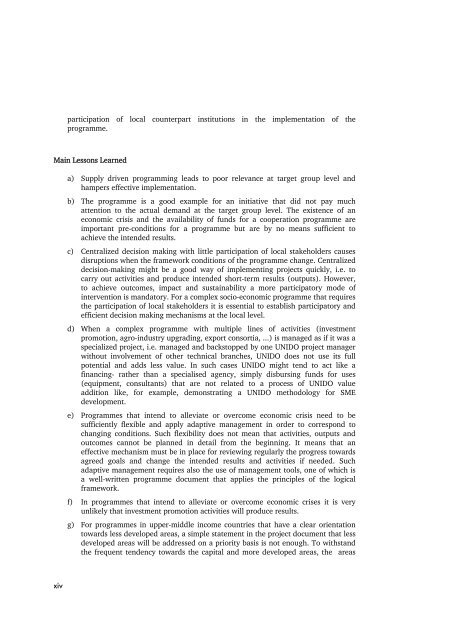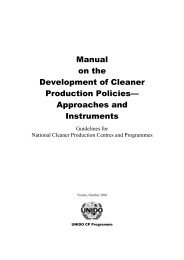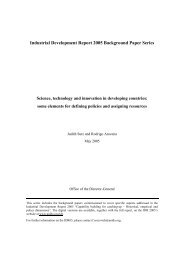ARGENTINA - Unido
ARGENTINA - Unido
ARGENTINA - Unido
You also want an ePaper? Increase the reach of your titles
YUMPU automatically turns print PDFs into web optimized ePapers that Google loves.
participation of local counterpart institutions in the implementation of the<br />
programme.<br />
Main Lessons Learned<br />
a) Supply driven programming leads to poor relevance at target group level and<br />
hampers effective implementation.<br />
b) The programme is a good example for an initiative that did not pay much<br />
attention to the actual demand at the target group level. The existence of an<br />
economic crisis and the availability of funds for a cooperation programme are<br />
important pre-conditions for a programme but are by no means sufficient to<br />
achieve the intended results.<br />
c) Centralized decision making with little participation of local stakeholders causes<br />
disruptions when the framework conditions of the programme change. Centralized<br />
decision-making might be a good way of implementing projects quickly, i.e. to<br />
carry out activities and produce intended short-term results (outputs). However,<br />
to achieve outcomes, impact and sustainability a more participatory mode of<br />
intervention is mandatory. For a complex socio-economic programme that requires<br />
the participation of local stakeholders it is essential to establish participatory and<br />
efficient decision making mechanisms at the local level.<br />
d) When a complex programme with multiple lines of activities (investment<br />
promotion, agro-industry upgrading, export consortia, ...) is managed as if it was a<br />
specialized project, i.e. managed and backstopped by one UNIDO project manager<br />
without involvement of other technical branches, UNIDO does not use its full<br />
potential and adds less value. In such cases UNIDO might tend to act like a<br />
financing- rather than a specialised agency, simply disbursing funds for uses<br />
(equipment, consultants) that are not related to a process of UNIDO value<br />
addition like, for example, demonstrating a UNIDO methodology for SME<br />
development.<br />
e) Programmes that intend to alleviate or overcome economic crisis need to be<br />
sufficiently flexible and apply adaptive management in order to correspond to<br />
changing conditions. Such flexibility does not mean that activities, outputs and<br />
outcomes cannot be planned in detail from the beginning. It means that an<br />
effective mechanism must be in place for reviewing regularly the progress towards<br />
agreed goals and change the intended results and activities if needed. Such<br />
adaptive management requires also the use of management tools, one of which is<br />
a well-written programme document that applies the principles of the logical<br />
framework.<br />
f) In programmes that intend to alleviate or overcome economic crises it is very<br />
unlikely that investment promotion activities will produce results.<br />
g) For programmes in upper-middle income countries that have a clear orientation<br />
towards less developed areas, a simple statement in the project document that less<br />
developed areas will be addressed on a priority basis is not enough. To withstand<br />
the frequent tendency towards the capital and more developed areas, the areas<br />
xiv
















